
Blind Voices is a 1978 science fiction novel by Tom Reamy. Reamy's only novel, it was published "posthumously in a complete but not final draft" [1] by Berkley Books.

Blind Voices is a 1978 science fiction novel by Tom Reamy. Reamy's only novel, it was published "posthumously in a complete but not final draft" [1] by Berkley Books.
In the early 1930s, three young women in a small Kansas town discover Haverstock's Traveling Curiosus and Wonder Show, and find themselves attracted to its exhibits — some of whom are far more than they seem.
Blind Voices won the 1979 Balrog Award for best novel, [2] and was a finalist for the Nebula Award for Best Novel of 1978 [3] the 1979 Hugo Award for Best Novel, [4] and the 1979 BSFA Award for Best Novel. [5]
Kirkus Reviews considered the novel to be "unsatisfying" and "disappointing", faulting Reamy's exposition as "plodding", and "at odds" with the "grotesqueness" of the subject matter. [6] Jo Walton, conversely, described it as "beautifully written" and "Bradburyesque". [7]
Roz Kaveney found its ending to be "slightly tentative and elegiac", and noted that Haverstock's creation of the freaks via rudimentary genetic engineering was a "pretext" for classifying the book as science fiction — one which "has little to do with the feel or plot." [1] Algis Budrys called the novel "substantial" and "adventurous and suspenseful", lauding Reamy's depictions of characters and setting, and stating that if he were to — like Reamy — be found dead at his typewriter, he "wouldn't be ashamed if something like Blind Voices were in it." [8]

Poul William Anderson was an American fantasy and science fiction author who was active from the 1940s until the 21st century. Anderson also wrote historical novels. His awards include seven Hugo Awards and three Nebula Awards.
Roger Joseph Zelazny was an American poet and writer of fantasy and science fiction short stories and novels, best known for The Chronicles of Amber. He won the Nebula Award three times and the Hugo Award six times, including two Hugos for novels: the serialized novel ...And Call Me Conrad (1965), subsequently published under the title This Immortal (1966) and then the novel Lord of Light (1967).

Damon Francis Knight was an American science fiction author, editor, and critic. He is the author of "To Serve Man", a 1950 short story adapted for The Twilight Zone. He was married to fellow writer Kate Wilhelm.
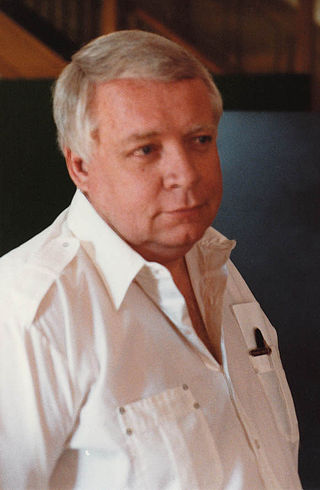
Algirdas Jonas "Algis" Budrys was a Lithuanian-American science fiction author, editor, and critic. He was also known under the pen names Frank Mason, Alger Rome, John A. Sentry, William Scarff, and Paul Janvier. He is known for the influential 1960 novel Rogue Moon.
Lester del Rey was an American science fiction author and editor. He was the author of many books in the juvenile Winston Science Fiction series, and the editor at Del Rey Books, the fantasy and science fiction imprint of Ballantine Books, along with his fourth wife Judy-Lynn del Rey.
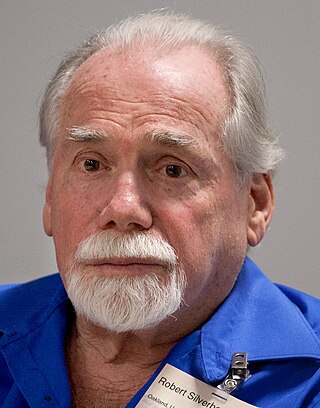
Robert Silverberg is an American author and editor, best known for writing science fiction. He is a multiple winner of both Hugo and Nebula Awards, a member of the Science Fiction and Fantasy Hall of Fame, and a Grand Master of SF. He has attended every Hugo Award ceremony since the inaugural event in 1953.

Tom Reamy was an American science fiction and fantasy author and a key figure in 1960s and 1970s science fiction fandom. He died at age 42 prior to the publication of his first novel; his work is primarily dark fantasy.
Alexei Panshin was an American writer and science fiction critic. He wrote several critical works and several novels, including the 1968 Nebula Award–winning novel Rite of Passage and, with his wife Cory Panshin, the 1990 Hugo Award–winning study of science fiction The World Beyond the Hill.
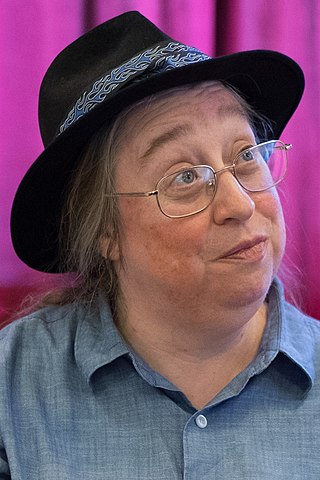
Jo Walton is a Welsh and Canadian fantasy and science fiction writer and poet. She is best known for the fantasy novel Among Others, which won the Hugo and Nebula Awards in 2012, and Tooth and Claw, a Victorian era novel with dragons which won the World Fantasy Award in 2004. Other works by Walton include the Small Change series, in which she blends alternate history with the cozy mystery genre, comprising Farthing, Ha'penny and Half a Crown. Her fantasy novel Lifelode won the 2010 Mythopoeic Award, and her alternate history My Real Children received the 2015 Tiptree Award.

Gordon Randall Phillip David Garrett was an American science fiction and fantasy author. He was a contributor to Astounding and other science fiction magazines of the 1950s and 1960s. He instructed Robert Silverberg in the techniques of selling large quantities of action-adventure science fiction, and collaborated with him on two novels about men from Earth disrupting a peaceful agrarian civilization on an alien planet.

Lord Valentine's Castle is a novel by Robert Silverberg published in 1980.

The Squares of the City is a science fiction novel by British writer John Brunner, first published in 1965 (ISBN 0-345-27739-2). It was nominated for the Hugo Award for Best Novel in 1966.
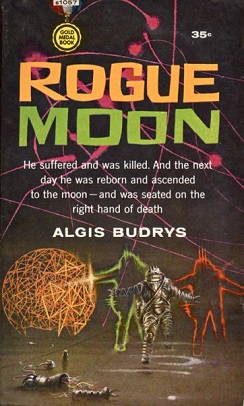
Rogue Moon is a short science fiction novel by American writer Algis Budrys, published in 1960. It was a 1961 Hugo Award nominee. A substantially cut version of the novel was originally published in F&SF; this novella-length story was included in The Science Fiction Hall of Fame, Volume Two, edited by Ben Bova. It was adapted into a radio drama by Yuri Rasovsky in 1979.
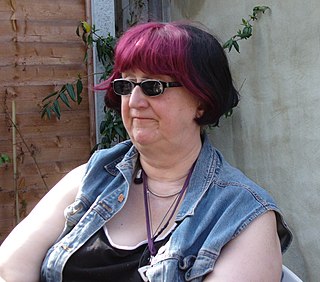
Roz Kaveney is a British writer, critic, and poet, best known for her critical works about pop culture and for being a core member of the Midnight Rose collective. Kaveney's works include fiction and non-fiction, poetry, reviewing, and editing. Kaveney is also a transgender rights activist. She has contributed to several newspapers such as The Independent and The Guardian. She is also a founding member of Feminists Against Censorship and a former deputy chair of Liberty. She was deputy editor of the transgender-related magazine META.
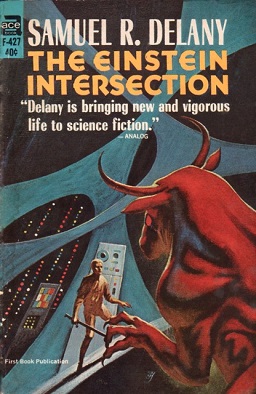
The Einstein Intersection is a 1967 science fiction novel by Samuel R. Delany. The title is a reference to Einstein's Theory of Relativity connecting to Kurt Gödel's Constructible universe, which is an analogy to science meeting philosophy. Delany's intended title for the book was A Fabulous, Formless Darkness.

Stardance is a science fiction novel by Spider Robinson and Jeanne Robinson, published by Dial Press in 1979 as part of its Quantum science fiction line. The novel's opening segment originally appeared in Analog in 1977 as the novella "Stardance", followed by the serialized conclusion, "Stardance II", in Analog in 1978.
The Balrog Awards were a set of awards given annually from 1979 to 1985 for the best works and achievements of speculative fiction in the previous year. The awards were named after the balrog, a fictional creature from J. R. R. Tolkien's Middle-earth legendarium. The awards were originally announced by editor Jonathan Bacon in Issue #15 of Fantasy Crossroads and presented at the Fool-Con II convention on April Fool's Day, 1979 at Johnson County Community College, Kansas. The awards were never taken seriously and are often referred to, tongue-in-cheek, as the "coveted Balrog Awards".
"Nobody Bothers Gus" is a 1955 science fiction short story by Algis Budrys. It was first published in Astounding Science-Fiction.
In Viriconium is a novel by M. John Harrison published in 1982.

An Informal History of the Hugos is a 2018 reference work on science fiction and fantasy written by Jo Walton. In it, she asks if the nominees for the Hugo Award for Best Novel were indeed the best five books of the year, using as reference shortlists from other awards in the genre. After looking at the first 48 years of the award and presenting essays on select nominees, Walton concludes that the Hugo has a 69% success rate. The book was well-received and was itself nominated for a Hugo Award in 2019.